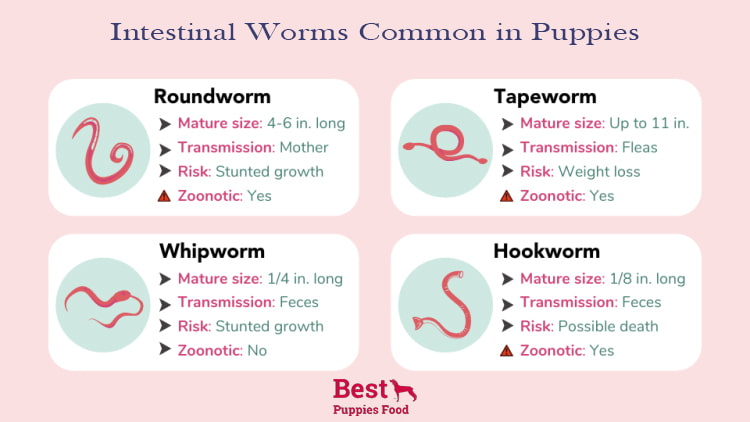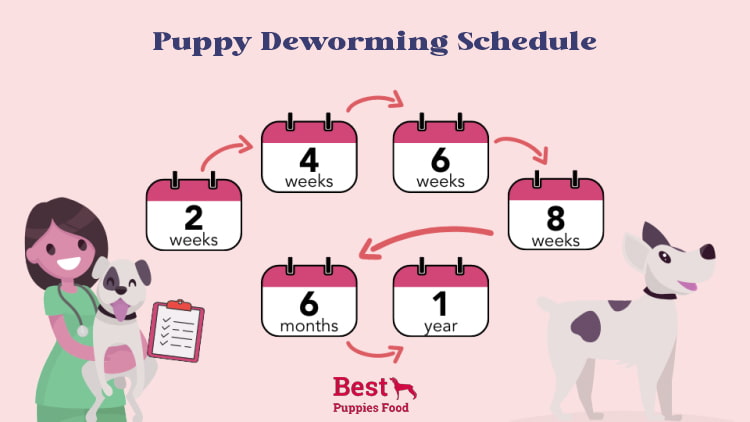Stop the parasites before they can get to your puppy! If worm infection in puppies concerns you this is your ultimate puppy deworming schedule to follow. Puppies have the higher risk of severity due to worm infection. Worm infection in puppies is a common issue in our clinics.
As a veterinarian, I have compiled a comprehensive guide for puppy deworming that includes what deworming is, how to identify different worms, symptoms of worm infection. The simplest puppy deworming schedule, as well as a step-by-step guide on how to deworm your puppy.
Table of Contents
ToggleWhat is puppy deworming and How do puppies get worms?
Deworming is the process of removing worms from a puppy’s body through medication prescribed by a veterinarian. Deworming is important as our little puppies have an extremely weak immune system and a simple worm infection can easily turn fetal for them.
Puppies can get infected from their mothers during the pregnancy or nursing period, later on puppies can easily get infected through other animals and infected objects in their environments.

What worms are common in puppies?
This will help you to prepare with the knowledge needed to maintain the puppy deworming schedule. Commonly, 4 types of worms are found in puppies. Take a look to identify different types of worms found in puppies in order to ensure proper grooming of your little friend.
Roundworms (ascarids)
The most common parasites found in puppies are roundworms.The worms can spread from mother to little puppies due to pregnancy or nursing. These parasites are long, spaghetti-like worms.
Tapeworms
These are flat worms with a segmented body. The fleas and small animals are the carriers of these worms. Contact with such an animal can transmit the worms in the puppy’s body resulting in possible infection.
Whipworms
Whipworms are thin, and have a thread-like body structure. Thes parasites live in the large intestine of dogs. They spread through direct contact with soil or feces contaminated with whipworm eggs.
Hookworms
Hookworms are small, thin worms that attach to the lining of the small intestine and feed on the host’s blood. Puppies can become infected by ingesting hookworm larvae from contaminated environments or through the mother’s milk.

What are the symptoms of worms in puppies?
While maintaining a puppy deworming schedule you may need some more knowledge about worm infection. In case of worm infection in puppies you must be aware of the relevant symptoms to ensure your puppy’s optimal wellbeing.
Diarrhea
One of the common causes behind Puppy Diarrhea is parasite attack. If your puppy is infected by worms they may encounter signs and symptoms of Puppy Diarrhea.
Vomiting
Watch out for puppy vomiting as worm infection can cause moderate to severe vomiting in puppies. The severity of vomiting depends on the severity of the infection.
Poor appetite
Infected puppies often lose appetite due to the infection. Observe if your puppy is eating their usual meal portions or if they are not responding to feeding cues according to their feeding schedule anymore. Lack of appetite is a great indicator of puppy health and wellbeing.
Weight loss
It is a good practice to monitor puppy’s weight on a regular basis. If you suspect sudden weight loss this can be an indication toward a worm infection in your puppy. Worms can take up your puppy’s nutrition causing weight loss. Compare your puppy’s current weight to the previous weight to identify weight loss.
Swollen belly
In cases of severe roundworm infestations, puppies may develop a swollen belly due to the accumulation of large numbers of worms in the intestines. This condition is often referred to as “pot-bellied” appearance.
Coughing
Worms can migrate to the respiratory system and cause coughing in puppies. This may worsen during physical activity or at night.
Lethargy
Worm infection can make your puppy lethargic, weak, or less active than usual as parasite drain leads to discomfort and gut inflammation. They may show difficulty in standing or walking.
Poor coat condition
Worms can affect a puppy’s overall health and nutrient absorption, leading to a dull, dry, or unhealthy coat. The coat may lose its shine and become rough or patchy in comparison to the healthy appearance of a puppy’s coat.
Poor coat condition
Worms can affect a puppy’s overall health and nutrient absorption, leading to a dull, dry, or unhealthy coat. The coat may lose its shine and become rough or patchy in comparison to the healthy appearance of a puppy’s coat.

Puppy Deworming Schedule
After 7 years of experience, much research and observation I have come up with the ultimate puppy deworming schedule that has helped my clients over the years to ensure zero worm infection. Here is the puppy deworming schedule to follow and enjoy.
1st Deworming Session: At 2 weeks of age
Your puppy’s first deworming session will start as a newborn 2 weeks old. Worms can often transfer from mother to puppy, causing severe worm infection. This first schedule is extremely delicate and important as your puppy has an extremely weak immune system and the infection.
2nd Deworming Session: At 4 weeks of age
To eliminate any newly developed worms you need to repeat the deworming session again at the age of 4 weeks. This will also aid in eliminating any remaining parasites from the previous treatment.
This session has also significance as your puppy has yet not developed their immune system and has been still drinking mother’s milk.
3rd Deworming Session: At 6 weeks of age
As your puppy has now moved from mothers milk to puppy food and gained some mobility it is time for another round of deworming at the age of 6 weeks.
Although your puppy has now developed a little better immune system yet they are extremely vulnerable to worm infection and its severity.
4th Deworming Session: At 8 weeks of age
At the age of 8 weeks now your puppy is much more independent and has a much more active life. This active life comes with increases in risks including more opportunities for worms to attack your adorable pup.
Therefore do ensure proper vaccination accompanied by a deworming session to give their healthy happy l;ife a little boost.
5th+ Deworming Sessions: At 1+ Year of age
With time your puppy will develop a much stronger immune system. You may not need as many frequent deworming sessions as before. However, ensure to continue mandatory deworming sessions every 3-6 months to ensure your puppy is not under attack by any types of worms.
How to deworm puppies effectively
- Now that you are aware of potential risk symptoms and the puppy deworming schedule, I have created a step by step guide to deworm your little friend. Here are 5 steps to follow to deworm puppies effectively.
- Step 1: Take your puppy to the vet to get deworming advice.
- Step 2: Give the deworming medicine as the vet tells you.
- Step 3: Keep things clean to stop worms coming back.
- Step 4: Watch out for any signs your puppy feels bad.
- Step 5: Go back to the vet for more deworming if needed.
How much does it cost to deworm a puppy?

Here is a price chart of how much it will cost you to deworm a puppy around the world.
| Region | Price Range (USD) |
| North America | $25 – $75 |
| South America | $10 – $30 |
| Canada | $30 – $80 |
| Europe | $24 – $60 |
| Asia | $6 – $40 |
| Africa | $9 – $30 |
| Australia/Oceania | $22 – $60 |
Conclusion
Our little puppies are extremely vulnerable to worm infections and parsita attacks. It is our responsibility as their caretaker to ensure their overall wellbeing. Therefore regular deworming and maintaining a clean environment to prevent worm infection can indeed save your puppy’s life and contribute to the healthy and happy life of your little friend.
Frequently Asked Questions
How To Deworm A Puppy?
Consult your trusted vet and give the medication to your puppy accordingly. Watch out for signs and symptoms of sensitivity to the medication.
When To Deworm Puppies?
Deworm at 2, 4, 6, and 8 weeks; then every 3 months.
How Many Dewormings Does A Puppy Need?
Typically 3 to 4 times in the first few months.
Why is deworming important for puppies?
Prevents health issues and ensures puppy growth and development.





